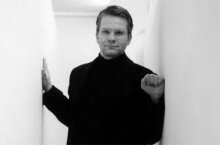Nederlands ►

Born in Dresden in 1962, Durs Grünbein is the most significant and successful poet of his generation in Germany. A modern poeta doctus, his streetwise, ironic style belies at first the deep seriousness of his project and the emotional resonance at its core. His poems range across the most eclectic of material: from classical sources to quantum physics; from the Anglo-American poetic tradition to contemporary neuroscience; from a philosophical celebration of Descartes to an elegy for Dresden.
For many he was the poet of the united Germany after unification; but the award of the prestigious Georg Büchner Prize in 1994 marks a change in direction. Michael Hofmann’s Ashes for Breakfast brought Grünbein into English for the first time in 2005 and transmits a powerful sense of a certain neurotic urban energy. Grünbein has written a good deal since then, and his tone continues to change. Largely gone is his ‘aesthetic of sarcasm’: loose-limbed poems literally stripping things to the bone with his anatomically-inflected cynicism.
A move from Berlin to Rome saw a shift to a classical backdrop, new formal constraints, and an austere, architectural voice in Aroma (2010) and Koloss im Nebel (2012). Yet recent poems point to a more fractured aesthetic and a more personal, playful voice. Since 1988, when the then-25-year-old burst onto the scene with a mordant reckoning with the East Germany he grew up in (Grauzone morgens), Grünbein has published more than 30 books of poetry and prose, which have been translated into dozens of languages. He himself has also translated: including, Aeschylus, Seneca and Sarah Kane, and has worked with contemporary Japanese poet Yûji Nawata (Lob des Taifuns, 2009).
His prolific translations of classical and contemporary authors, along with essays on modern European literature and work with contemporary visual artists, composers and filmmakers, make him a profoundly European writer, exploring the reach and history of literature across a broad palette. This is reflected in his many international awards and prizes.
Bibliography
Poetry
Grauzone morgens, poems, 1988
Schädelbasislektion, poems, 1991
Den Teuren Toten, poems, 1994
Falten und Fallen, poems, 1994
Galilei vermisst Dantes Hölle und bleibt an den Massen hängen, essays, 1996
Nach den Satiren, poems, 1999
Das erste Jahr, essays, 2001
Erklärte Nacht, poems (2002
Una Storia Vera, Ein Kinderalbum in Versen, poems, 2002
Warum schriftlos leben, essays, 2003
Vom Schnee oder Descartes in Deutschland, poem, 2003
An Seneca. Postskriptum, 2004
Antike Dispositionen. essays, 2005
Porzellan. Poem vom Untergang meiner Stadt, poem, 2005
Der Misanthrop auf Capri, histories and poems, 2005
Strophen für übermorgen, poems, 2007
Der cartesische Taucher: Drei Meditationen, essays, 2008
Lob des Taifuns, poems, 2008
Die Bars von Atlantis: Eine Erkundigung in vierzehn Tauchgängen, essays, 2009
Vom Stellenwert der Worte, essays, 2010
Aroma. Ein römisches Zeichenbuch, poems, 2010
Koloss im Nebel, poems, 2012
Cyrano oder die Rückkehr vom Mond, poems, 2014
In English
Ashes for Breakfast: Selected Poems, trans. Michael Hofmann, 2005
The Bars of Atlantis: Selected Essays, ed. Michael Eskin, 2010
Descartes' Devil: Three Meditations, trans. Anthea Bell, 2010
The Vocation of Poetry, trans. Michael Eskin, 2011
Mortal Diamond: Selected Poems, trans. Michael Eskin, 2013
Selected awards
Georg Büchner Prize (1994)
Friedrich Nietzsche Prize (2004)
Friedrich Hölderlin Prize (2005)
Berlin Literature Prize (2006)
Premio Internazionale di Poesia Pier Paolo Pasolini (2006)
Samuel Bogumil Linde Prize (2009)
Ordre Pour le Mérite (2008)
Great Cross of Merit with Star (2009)
Tomas Tranströmer Prize (2012)

